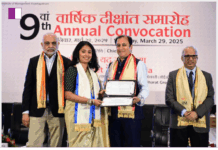Khubaib Abdul Salam understands a truth many entrepreneurs only recognize after hard-earned experience technical mastery alone doesn’t build great companies. As Co-Founder and CEO at Lanstitut, Khubaib Abdul Salam has openly reflected on his early entrepreneurial beliefs and how they evolved over time not through abstract theories, but through the practical, often unforgiving lessons of building a business from the ground up.
Khubaib Abdul Salam began his journey like countless others, firmly believing that excellence in one’s core domain whether it be product development, marketing, finance, or operations would naturally lead to success. His thinking mirrored the conventional wisdom if you are the best coder, marketer, or strategist, the business will follow. But as Khubaib Abdul Salam candidly shared, reality quickly challenged that assumption. It wasn’t long before he realized that sharp technical skills, while necessary, are not nearly sufficient to sustain or scale a business.
The insight that reshaped Khubaib Abdul Salam’s approach is straightforward but powerful businesses are built by people, not just by ideas, products, or capital. In practice, that means no matter how revolutionary your product is, it won’t build itself. No matter how well you know the market, it won’t grow without meaningful connections. And no matter how ingenious your solution, it won’t get funded unless stakeholders believe in it and in you.
For Khubaib Abdul Salam, one of the most humbling and essential shifts was moving beyond being simply a “domain expert” to becoming a “people leader.” Entrepreneurship demands versatility; founders inevitably wear many hats. But among those hats, leadership not technical brilliance determines whether teams stay engaged, investors stay committed, and customers stay loyal.
Khubaib Abdul Salam puts it clearly leadership isn’t about being the smartest person in the room. It’s about assembling the right people and helping them believe in a collective mission. This isn’t mere motivational rhetoric. The day-to-day reality of running a startup forces founders to inspire alignment across varied stakeholders from employees and co-founders to investors and early adopters. Without that alignment, even the best strategies crumble.
What Khubaib Abdul Salam highlights in his reflection resonates broadly, especially in today’s startup ecosystem. Far too often, early-stage founders pour all their energy into product-market fit while underestimating the importance of team dynamics, communication, and stakeholder management. It’s not that technical skills don’t matter they do but as Khubaib Abdul Salam discovered, those skills are only impactful when embedded in a culture of trust and collaboration.
When you peel back the layers of many startup failures, as Khubaib Abdul Salam likely has, you don’t just see technical gaps; you see misaligned teams, fractured communication, and founders who struggled to inspire or negotiate with the people around them. Conversely, many successful companies don’t have the absolute best product on day one but they have cohesive teams who believe in the vision and are committed to building towards it. This is exactly the insight Khubaib Abdul Salam emphasizes without people management and emotional intelligence, even the sharpest business ideas falter.
Khubaib Abdul Salam’s reflections also underscore the evolving role of the modern entrepreneur. Today, being a founder means balancing technical knowledge with interpersonal leadership. This doesn’t mean every founder has to become a charismatic extrovert. But it does mean developing the ability to communicate clearly, negotiate strategically, and empathize deeply with employees, customers, and partners. For Khubaib Abdul Salam, this is not optional it’s fundamental.
His message is especially pertinent in an age where startups and small businesses are more accessible than ever before. The barriers to entry in technology and entrepreneurship have fallen, but the human challenges remain just as steep. Khubaib Abdul Salam’s own journey is a reminder that founders who neglect these leadership skills may struggle no matter how brilliant their core offering is.
Perhaps the most striking element of Khubaib Abdul Salam’s insight is the emphasis on humility and continuous evolution. He openly admits his initial naivety not as a point of failure, but as a necessary step in his learning curve. In doing so, Khubaib Abdul Salam sets a practical example for emerging entrepreneurs it’s not enough to stay within the comfort zone of your technical expertise. Growth comes from stretching into new, uncomfortable areas especially when it involves understanding and leading people.
Ultimately, Khubaib Abdul Salam’s philosophy converges on a simple truth if you can’t lead them, you can’t build it. This cuts through many of the myths of solo genius or product-first entrepreneurship. Business success, as Khubaib Abdul Salam now sees it, is not solely about code or capital it’s about people who trust, collaborate, and strive together.
For entrepreneurs reading Khubaib Abdul Salam’s reflections, the takeaway is clear. Yes, continue sharpening your technical edge. But don’t stop there. Invest in learning how to inspire, align, and communicate. As Khubaib Abdul Salam has shown through his own leadership at Lanstitut, these skills are not secondary soft skills they are core business competencies. They determine whether a product remains an idea or becomes a company, whether a team fragments or flourishes, and whether a founder remains stuck or scales.
Khubaib Abdul Salam’s journey offers a grounded reminder for anyone building something new your ideas matter, your skills matter but your ability to lead people matters more.





































